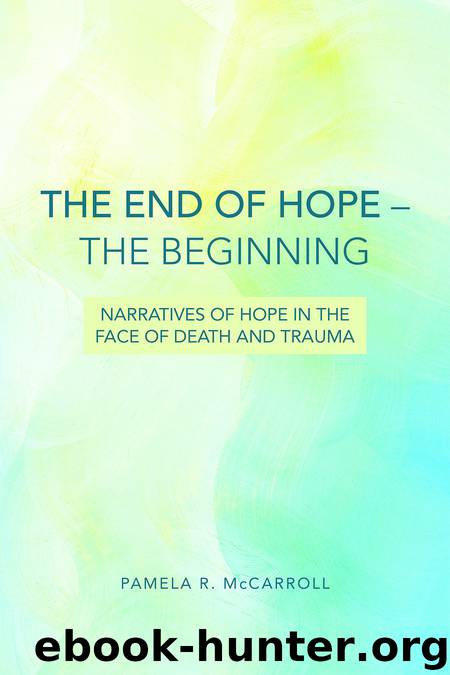End of Hope--The Beginning by McCarroll Pamela R

Author:McCarroll, Pamela R. [Pamela R. McCarroll]
Language: eng
Format: epub
ISBN: 978-1-4514-4192-5
Publisher: Fortress Press
Published: 2014-04-01T04:00:00+00:00
Possibilities and Limits
More than anyone else, Viktor Frankl focuses on the intrinsic connections between meaning, hope, and suffering. In his book Man’s Search for Meaning, Frankl outlines the ways the human “will to meaning” demonstrated through concrete meaningful actions can represent hope even in the most terrible and meaningless of circumstances. In descriptions of his life in a concentration camp, he tells how meaninglessness, misery, and a disconnection from anything but the immediacy of death and the cheapness of life left many in a state of dire hopelessness. He also describes moments in which meaningful actions among prisoners bore witness to the potential for meaning—a “yes” to life despite the spirit of meaninglessness and death that was everywhere present.[5] Affirming the centrality of meaning in life, Frankl quotes Nietzsche: “[One] who has a why to live can bear with almost any how.”[6] When one has a sense of purpose and meaning, almost any suffering can be endured and even endowed with purpose and meaning. “Saying ‘yes to life in spite of everything,’ . . . presupposes that life is potentially meaningful under any conditions, even those which are most miserable.”[7]
Later in his life in an interview, Frankl argues that as humans we need to admit our inability and incapacity to recognize the ultimate meaning of our lives in intellectual and rational terms, especially in the face of massive evil. However, we can still believe in ultimate meaning, to which meaningful action attests. Frankl describes despair as suffering without meaning. But the minute one takes a stand against meaninglessness through meaningful action, one can turn tragedy into triumph.[8]
In his autobiographical reflections on meaning, hope, suffering, and the human condition throughout his post-holocaust career, we see the extent to which he himself engages in acts of meaning making by weaving “the slender threads of a broken life into a firm pattern of meaning.”[9] We can see the degree to which, in giving voice to the horrors of the concentration camp and building his theory of logotherapy out of this experience, he endows his experience with meaning that opens up hope’s possibility in life—in his life and that of others.
While Frankl’s reflections on meaning and hope in the face of adversity are powerful and resonate with our present discussion, a couple of his insights need to be highlighted. For Frankl, one makes a decision for meaning, a decision for hope. He sees this decision as a responsibility to claim meaning in spite of all the negations in life. Further, Frankl emphasizes the role of the individual human agency to claim and construct such meaning and hope in life. While he does, at points, suggest that ultimate meaning exists beyond human understanding, his primary emphasis is upon meaning making as an aspect of being for which an individual needs to take responsibility. It is a human responsibility to construct meaning from the multiple fragments of our lives.
With some of Frankl’s work and that of others who focus on the importance of meaning making in
Download
This site does not store any files on its server. We only index and link to content provided by other sites. Please contact the content providers to delete copyright contents if any and email us, we'll remove relevant links or contents immediately.
The 5 Love Languages: The Secret to Love That Lasts by Gary Chapman(9782)
The Space Between by Michelle L. Teichman(6927)
Assassin’s Fate by Robin Hobb(6197)
Wiseguy by Nicholas Pileggi(5767)
Everything Happens for a Reason by Kate Bowler(4729)
Gerald's Game by Stephen King(4640)
Pillow Thoughts by Courtney Peppernell(4271)
A Simplified Life by Emily Ley(4156)
The Power of Positive Thinking by Norman Vincent Peale(4055)
Harry Potter and the Prisoner of Azkaban (Book 3) by J. K. Rowling(3346)
Resisting Happiness by Matthew Kelly(3336)
Girl, Wash Your Face by Rachel Hollis(3275)
Being Aware of Being Aware by Rupert Spira(3272)
The Code Book by Simon Singh(3175)
The Secret Power of Speaking God's Word by Joyce Meyer(3167)
More Language of Letting Go: 366 New Daily Meditations by Melody Beattie(3017)
Real Sex by Lauren F. Winner(3006)
Name Book, The: Over 10,000 Names--Their Meanings, Origins, and Spiritual Significance by Astoria Dorothy(2978)
The Holy Spirit by Billy Graham(2942)
